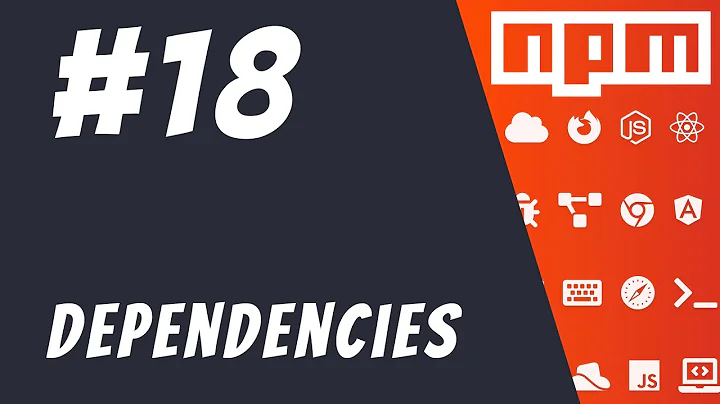How do I install package.json dependencies in the current directory using npm
Solution 1
Running:
npm install
from inside your app directory (i.e. where package.json is located) will install the dependencies for your app, rather than install it as a module, as described here. These will be placed in ./node_modules relative to your package.json file (it's actually slightly more complex than this, so check the npm docs here).
You are free to move the node_modules dir to the parent dir of your app if you want, because node's 'require' mechanism understands this. However, if you want to update your app's dependencies with install/update, npm will not see the relocated 'node_modules' and will instead create a new dir, again relative to package.json.
To prevent this, just create a symlink to the relocated node_modules from your app dir:
ln -s ../node_modules node_modules
Solution 2
In my case I need to do
sudo npm install
my project is inside /var/www so I also need to set proper permissions.
Solution 3
Just execute
sudo npm i --save
That's all
Related videos on Youtube
Daniel Beardsley
I'm an independent Web Developer located on the Central Coast of California. I mostly develop using Ruby on Rails, but have been trying out Sinatra, Node.js, and other fun things as of late.
Updated on June 07, 2020Comments
-
Daniel Beardsley almost 4 years
I have a web app: fooapp. I have a
package.jsonin the root. I want to install all the dependencies in a specificnode_modules directory. How do I do this?What I want
Lets say I have two
widgetdependencies. I want to end up with a directory structure like this:node_modules/ widgetA widgetB fooapp/ package.js lib ..What I get
when I run
npm install fooapp/I get this:node_modules/ fooapp/ node_modules/ widgetA widgetB package.js lib/ .. fooapp/ package.js lib/ ..npm makes a copy of my app directory in the node_modules dir and installs the packages inside another node_modules directory.
I understand this makes sense for installing a package. But I don't
require()my web app inside of something else, I run it directly. I'm looking for a simple way to install my dependencies into a specific node_modules directory. -
 Allen Koo over 10 yearssudo may be not required for npm install.
Allen Koo over 10 yearssudo may be not required for npm install. -
TheLonelyGhost almost 10 yearsDepending on the user that needs to execute the js file and dependencies installed, you can run
sudo -u [username] npm install. Better to justnpm installandchownthe node_modules directory recursively after the fact. -
melekes almost 10 yearsDespite that it is a working solution, I found out
npm linkis more convenient in such situations where you need to grab modules from another directory (see stackoverflow.com/a/14387210/820520) -
tkone over 9 yearsnever run npm with sudo unless you're using
-g-- and even then there are better ways to handle that. -
 aesede over 9 yearsThanks for you answer, but why is that? can you explain? I mean, what if I have a project in which I want or need to keep a folder with root permissions and install dependencies without -g there? maybe there's a good reason, but I did sudo npm install (without -g) a few times and never got any trouble. Cheers!
aesede over 9 yearsThanks for you answer, but why is that? can you explain? I mean, what if I have a project in which I want or need to keep a folder with root permissions and install dependencies without -g there? maybe there's a good reason, but I did sudo npm install (without -g) a few times and never got any trouble. Cheers! -
 aesede over 8 years@tkone, after a while I've come to this as a nice solution for Linux/OSX users that want to install globally without sudo: npm install -g without sudo by Kazé. Hope it helps to (L)ubuntu users like me.
aesede over 8 years@tkone, after a while I've come to this as a nice solution for Linux/OSX users that want to install globally without sudo: npm install -g without sudo by Kazé. Hope it helps to (L)ubuntu users like me. -
RredCat over 8 yearsI don't think that is a good idea to use sudo with any command on console except the commands that really require the root permissions.
-
 aesede over 8 years@RredCat I agree about the right way of doing this kind of stuff, but after a while I noticed that this discussion is migrating towards Ubuntu, it seems there's a problem in the way it manages some permissions and folders, that is forcing users to use
aesede over 8 years@RredCat I agree about the right way of doing this kind of stuff, but after a while I noticed that this discussion is migrating towards Ubuntu, it seems there's a problem in the way it manages some permissions and folders, that is forcing users to usesudo npm. Again, only in Ubuntu.




